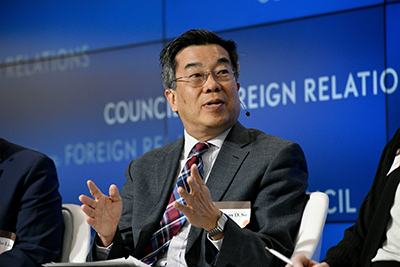International Health Faculty Presents Expert Recommendations On Antimicrobial Resistance to UN Secretary General

In an official ceremony at the United Nations (UN), Professor Anthony So handed off a report from the UN Interagency Coordination Group (IACG) on Antimicrobial Resistance (AMR) to UN Secretary General António Guterres. Professor So, as one of the co-conveners of the IACG, led efforts to draw upon evidence and expertise from those working in the field from UN member states and agencies, civil society and the private sector. As drug-resistant infections mount, the UN General Assembly called for the creation of this group with a mandate to provide practical guidance for approaches needed to ensure sustained, effective global action to address AMR.
At the UN, Professor So stressed that governments must urgently act on the IACG’s recommendations. “If we hope to have a future free from the fear of untreatable infections,” he warned, “we can pay now to address antimicrobial resistance—or pay much more later.” In addition to the call for immediate, planned, and united action, the IACG report notes that the toll from drug-resistant illnesses could result in 10 million deaths annually by 2050. By 2030, inaction could force 24 million more people into extreme poverty. The recommendations underscored the need for equitable and affordable access to antimicrobials, not just their effective stewardship, and aligned with the push towards universal health coverage.
Professor So’s work helps shape policies and programs that ensure access to life-saving antibiotics will be equitable and affordable for those in need. He serves as the Director of the Strategic Policy Program for ReAct - Action on Antibiotic Resistance. ReAct is a global network dedicated to meeting the challenge of antibiotic resistance. The Strategic Policy Program is also the Secretariat of the Antibiotic Resistance Coalition, comprised of civil society organizations working in health, agriculture, consumer and development sectors. Over the past year, the Program co-organized a three-day strategy conference for civil society on addressing AMR; a global teleconsultation for the Tripartite agencies (World Health Organization, Food and Agriculture Organization of the UN and the World Organization for Animal Health) on the Global Development and Stewardship Framework in advance of a Member State consultation; and convened civil society partners to discuss “Globalizing Food Campaigns: Sharing Strategies to Address Antimicrobial Resistance” in Bangkok, Thailand.
Innovation and Access to Health Technologies
Professor So also directs the School’s Innovation+Design Enabling Access (IDEA) Initiative. The IDEA Initiative has worked to foster the innovation and design of new technologies for greater health access and impact. For the Johns Hopkins Alliance for a Healthier World, he leads the thematic work on Transformative Technologies and Institutions. Through a University-wide Technology Product Lifecycle Committee, the theme has advanced discussion of norms of open access and open science to help ensure greater reach of the knowledge and innovation generated by the University.
The Initiative supports the teaching of a Summer Institute course on “Designing Transformative Innovation in Global Health” and organized the inaugural Leaders Enabling Access to Pharmaceuticals (LEAP) workshop introducing students to policy efforts to ensure innovation and affordable access to health technologies. The Initiative partners with ReAct and the International Federation of Medical Students’ Associations (IFMSA) to sponsor a global student design competition on AMR. Called Innovate4AMR, this year’s competition challenges student teams to develop innovative solutions in resource-limited healthcare settings. The WHO will support and co-fund the capacity-building workshop for the winning teams during World Antibiotic Awareness Week in Geneva (November 18 – 24, 2019). This year’s deadline to apply is September 16.
